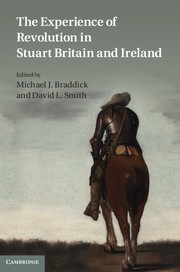Book contents
- Frontmatter
- Contents
- Notes on contributors
- Preface
- List of abbreviations
- JSM
- Introduction: John Morrill and the experience of revolution
- 1 The Scottish–English–Romish Book: the character of the Scottish Prayer Book of 1637
- 2 Popery in perfection? The experience of Catholicism: Henrietta Maria between private practice and public discourse
- 3 Sir Benjamin Rudyerd and England's ‘wars of religion’
- 4 Rhetoric and reality: images of Parliament as Great Council
- 5 Cathedrals and the British Revolution
- 6 History, liberty, reformation and the cause: Parliamentarian military and ideological escalation in 1643
- 7 Sacrilege and compromise: court divines and the king's conscience, 1642–1649
- 8 Law, liberty, and the English Civil War: John Lilburne's prison experience, the Levellers and freedom
- 9 On shaky ground: Quakers, Puritans, possession and high spirits
- 10 James Harrington's prescription for healing and settling
- 11 ‘The Great Trappaner of England’: Thomas Violet, Jews and crypto-Jews during the English Revolution and at the Restoration
- 12 The Cromwellian legacy of William Penn
- 13 Irish bishops, their biographers and the experience of revolution, 1656–1686
- 14 Religion and civil society: the place of the English Revolution in the development of political thought
- Bibliography of the major writings of John Morrill, 1967–2009
- Index
14 - Religion and civil society: the place of the English Revolution in the development of political thought
Published online by Cambridge University Press: 05 August 2011
- Frontmatter
- Contents
- Notes on contributors
- Preface
- List of abbreviations
- JSM
- Introduction: John Morrill and the experience of revolution
- 1 The Scottish–English–Romish Book: the character of the Scottish Prayer Book of 1637
- 2 Popery in perfection? The experience of Catholicism: Henrietta Maria between private practice and public discourse
- 3 Sir Benjamin Rudyerd and England's ‘wars of religion’
- 4 Rhetoric and reality: images of Parliament as Great Council
- 5 Cathedrals and the British Revolution
- 6 History, liberty, reformation and the cause: Parliamentarian military and ideological escalation in 1643
- 7 Sacrilege and compromise: court divines and the king's conscience, 1642–1649
- 8 Law, liberty, and the English Civil War: John Lilburne's prison experience, the Levellers and freedom
- 9 On shaky ground: Quakers, Puritans, possession and high spirits
- 10 James Harrington's prescription for healing and settling
- 11 ‘The Great Trappaner of England’: Thomas Violet, Jews and crypto-Jews during the English Revolution and at the Restoration
- 12 The Cromwellian legacy of William Penn
- 13 Irish bishops, their biographers and the experience of revolution, 1656–1686
- 14 Religion and civil society: the place of the English Revolution in the development of political thought
- Bibliography of the major writings of John Morrill, 1967–2009
- Index
Summary
John Morrill brought his seminal essay on ‘The religious context of the English Civil War’ to an end with a flourish: ‘The English Civil War’, he concluded, ‘was not the first European revolution: it was the last of the Wars of Religion’. A decade after the words were first written, John expressed some regret that the essay had not been thought out as well as he would have liked, and had misled others about the position he held. He focused particularly on the perennial difficulty of separating the religious from other contexts and causes. His flourish was not intended to claim that the Civil War was only about religion, although, as with other early modern religious wars, ‘religious poles are the ones around which most other discontents formed’. But the underlying issue remained that of separating religion from other things:
There are no historians nowadays who would deny that religion was an important dynamic within it [the Civil War]. But many would suggest that the use of the term ‘religion’ itself is unhelpful…[R]eligion is so interpenetrated into every aspect of early modern thought, that to say that it is the religious aspects of their thought that matters in making and shaping the conflict is a tautology.
These thoughts of John Morrill are the starting point for the present essay: how can the interpenetration of religion into all of early modern thought be teased apart for analysis?
- Type
- Chapter
- Information
- The Experience of Revolution in Stuart Britain and Ireland , pp. 270 - 290Publisher: Cambridge University PressPrint publication year: 2011



